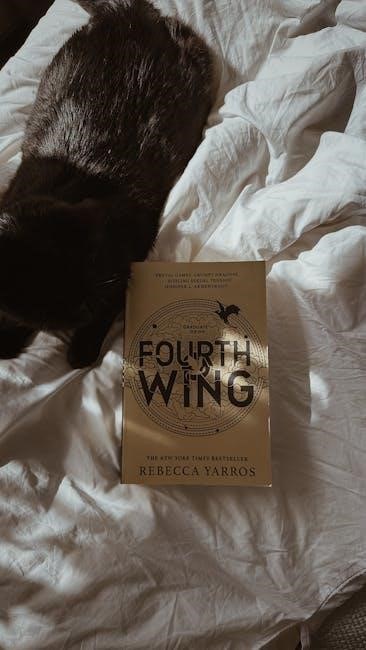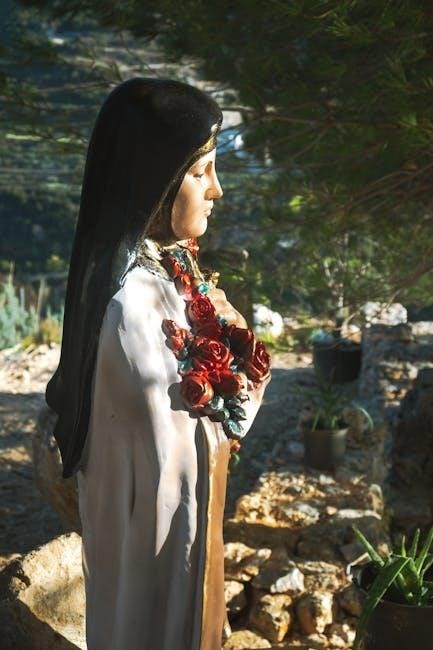
pdf rebecca
Daphne du Maurier’s Rebecca is a 1938 Gothic novel about a young woman marrying a widower, uncovering secrets of his late wife, Rebecca. A bestseller, it explores themes of love, jealousy, and identity, captivating readers with its haunting atmosphere and psychological depth, making it a timeless classic in English literature.
1.1 Background of the Novel
Rebecca, written by Daphne du Maurier, is a Gothic novel published in 1938. It tells the story of a young, unnamed narrator who marries Maxim de Winter, a wealthy widower, and uncovers the haunting legacy of his late wife, Rebecca. The novel is set in the fictional estate of Manderley, which serves as a central symbol of the story. Du Maurier drew inspiration from her own life experiences, including her marriage and fascination with grand estates. The novel’s atmospheric and psychological depth, combined with its exploration of themes like love, jealousy, and identity, contributed to its massive success. Since its release, Rebecca has become a timeless classic, selling over 2.8 million copies by 1965 and remaining widely popular. Its enduring appeal lies in its ability to captivate readers with its mysterious and haunting narrative.
1.2 Publication History
Daphne du Maurier’s Rebecca was first published in 1938 by Victor Gollancz in the United Kingdom and later by Doubleday in the United States. The novel was an instant success, becoming a bestseller and establishing du Maurier as a prominent author of Gothic fiction. Since its release, Rebecca has never gone out of print, a testament to its enduring popularity. The novel sold over 2.8 million copies between 1938 and 1965, solidifying its place as a classic of 20th-century literature. Over the years, numerous editions have been published, including special anniversary editions, further cementing its status as a beloved and influential work. Its publication marked a significant milestone in du Maurier’s career and remains a cornerstone of Gothic and romantic literature.
1.3 Initial Reception
The initial reception of Rebecca was overwhelmingly positive upon its release in 1938. Critics praised the novel for its masterful storytelling, atmospheric setting, and psychological depth. Readers were captivated by the mysterious and haunting tale of love, loss, and obsession. The novel quickly became a bestseller, resonating with audiences for its exploration of complex themes such as jealousy and identity. Despite some initial skepticism about the unnamed narrator, the book’s ability to evoke strong emotions and its vivid portrayal of characters like Maxim de Winter and Rebecca herself earned widespread acclaim. The novel’s success also led to its adaptation into a successful film directed by Alfred Hitchcock in 1940, further cementing its place in literary and cinematic history. The positive reception established Rebecca as a classic of Gothic fiction, ensuring its lasting impact on literature and popular culture.

Plot Summary
Rebecca follows a young, unnamed narrator who marries the wealthy widower Maxim de Winter, uncovering the lingering influence of his late wife, Rebecca, at Manderley, leading to secrets and tension.
2.1 Setting and Atmosphere
The novel is set primarily at Manderley, the grand estate of Maxim de Winter in Cornwall, England. Manderley serves as both a character and a symbol, embodying the legacy of the de Winter family. Its oppressive grandeur and intricate details create a gothic atmosphere, reflecting the psychological tension and secrets within. The narrator’s modest upbringing contrasts sharply with Manderley’s opulence, heightening her feelings of inadequacy. The setting is rich in sensory details, from the labyrinthine halls to the overgrown gardens, evoking a sense of decay and mystery. The Cornish landscape adds to the isolation, while the interior of Manderley, with its lavish decor, mirrors the complexities of its inhabitants. Fire imagery, particularly the eventual burning of Manderley, symbolizes purification and the destruction of the past, weaving into the novel’s themes of obsession and identity. The atmosphere is haunting, with Rebecca’s unseen presence lingering, creating a sense of foreboding and unease.
2.2 Major Plot Points
The novel begins with the unnamed narrator meeting Maxim de Winter in Monte Carlo, where she works as a companion to the demanding Mrs. Van Hopper. After a whirlwind romance, they marry, and she moves to Manderley, Maxim’s imposing estate in Cornwall. Upon arrival, she is confronted with the lingering presence of Rebecca, Maxim’s deceased first wife, whose memory dominates the house and its staff, particularly the sinister housekeeper, Mrs. Danvers. The narrator struggles to adapt to her new role, feeling overshadowed by Rebecca’s perfection. A series of discoveries, including Rebecca’s bedroom and her hidden correspondence, deepen the narrator’s insecurities. The tension escalates when Rebecca’s body is found, revealing her true nature, and Maxim confesses the dark truth about their marriage. The novel builds toward a climactic revelation, forever altering the narrator’s understanding of Maxim and Rebecca.
2.3 Climax and Resolution
The climax unfolds when Rebecca’s body is discovered, revealing her true identity and the circumstances of her death. Maxim confesses to the narrator that Rebecca was manipulative and unfaithful, and he admits to killing her in a fit of rage. This revelation shatters the narrator’s illusions about Rebecca’s perfection. The resolution follows as Manderley is destroyed by a fire, symbolizing the end of Rebecca’s haunting presence. The novel concludes with the narrator and Maxim rebuilding their lives, free from Rebecca’s shadow. The resolution underscores themes of liberation and the power of truth, leaving the narrator with a newfound sense of identity and strength. The ending is both poignant and hopeful, marking the beginning of a new chapter for the couple.

Characters
The novel revolves around the unnamed narrator, Maxim de Winter, and the enigmatic Rebecca. Other key characters include Mrs. Danvers, Jack Favell, and Frank Crawley, each shaping the story’s tensions and themes of jealousy, love, and identity.
3.1 The Narrator
The narrator of Rebecca is an unnamed young woman who marries Maxim de Winter, a wealthy widower, and struggles to navigate her new role at Manderley. Her youth, naivety, and insecurities are central to the story, as she grapples with the shadow of Rebecca, Maxim’s late wife. Throughout the novel, the narrator’s voice is introspective and emotional, revealing her inner turmoil and growth. Despite her lack of a name, she is a dynamic character, evolving from a timid bride to a stronger, more self-aware individual. Her journey is marked by her attempts to understand Maxim’s past and her own place in his life, making her a relatable and sympathetic figure. The narrator’s perspective is crucial, as it shapes the reader’s understanding of the plot and themes, such as identity, love, and jealousy.
3.2 Maxim de Winter
Maxim de Winter is the enigmatic and brooding master of Manderley, whose past is shrouded in mystery. Haunted by the memory of his late wife, Rebecca, he is a complex character with a mix of charm and emotional distance. His relationship with the narrator is central to the story, revealing his internal conflict and lingering attachment to Rebecca. Despite his aristocratic demeanor, Maxim is portrayed as a man struggling with guilt and the consequences of his actions. His character evolves as the truth about Rebecca and his past gradually unfolds, showcasing his vulnerability and the depth of his emotions. Maxim’s interactions with the narrator and other characters highlight his dual nature, blending authority with a hidden fragility, making him a compelling and multifaceted figure in the novel.
3.3 Rebecca
Rebecca, the late wife of Maxim de Winter, is a central yet enigmatic figure in the novel, whose presence permeates Manderley long after her death. Described as beautiful, charismatic, and confident, Rebecca is portrayed through the memories and perceptions of others, creating an aura of mystery and intrigue. Her influence over the household and Maxim is profound, leaving the narrator feeling overshadowed and inadequate. Despite her death, Rebecca’s character dominates the story, shaping the dynamics between the narrator, Maxim, and the staff at Manderley. The novel gradually reveals the complexities of her personality and the truth about her life, challenging the narrator’s initial perceptions. Rebecca’s legacy serves as a catalyst for the narrator’s journey of self-discovery and understanding of her marriage. Her character embodies themes of identity, jealousy, and the lingering impact of the past on the present.
3.4 Other Key Characters
Beyond the central figures, several other characters play pivotal roles in shaping the narrative of Rebecca. Mrs. Danvers, the sinister housekeeper of Manderley, is deeply devoted to Rebecca’s memory and resents the new Mrs. de Winter, creating a hostile environment for her; Her obsession with Rebecca adds to the eerie atmosphere of the estate. Jack Favell, Rebecca’s cousin, represents her scandalous past and emerges as a threat to Maxim’s reputation. Frank Crawley, the loyal estate manager, provides a voice of reason and support for the narrator. Beatrice, Maxim’s sister, offers a contrasting perspective with her practical and grounded nature. These characters collectively contribute to the psychological tension and unraveling of secrets, each embodying different facets of the novel’s complex web of relationships and motivations.

Themes
Rebecca explores themes of love, obsession, jealousy, identity, and class. These elements intertwine to create a psychological narrative, delving into the complexities of human relationships and societal expectations.
4.1 Love and Obsession
The theme of love and obsession is central to Rebecca, as it explores the complexities of romantic relationships and the destructive power of fixation; The unnamed narrator’s impulsive marriage to Maxim de Winter is driven by her infatuation, which gradually turns into an obsession to understand his past and compete with the memory of Rebecca. Maxim, too, is haunted by his feelings for Rebecca, revealing a tangled web of love, guilt, and possession. The novel portrays love as both a redemptive force and a destructive one, highlighting how obsession can distort reality and lead to devastating consequences. Through the characters’ psychological struggles, du Maurier examines the darker aspects of love and its ability to both unite and isolate individuals.
4.2 Jealousy and Rivalry
Jealousy and rivalry are pervasive themes in Rebecca, fueling the tension between the narrator and the enigmatic Rebecca. The narrator’s jealousy stems from her inability to eclipse Rebecca’s memory, which dominates Manderley and Maxim’s psyche. Rebecca, though deceased, becomes a phantom rival, symbolizing the narrator’s insecurity and inadequacy. Maxim’s past relationship with Rebecca further complicates this dynamic, as his lingering emotions create a sense of competition. The novel illustrates how jealousy can distort perceptions, leading to misunderstandings and conflict. Through this theme, du Maurier explores the psychological effects of rivalry, revealing how it can both motivate and destroy individuals. The interplay between love and jealousy underscores the fragile nature of human relationships, making it a compelling aspect of the novel’s exploration of human emotions.
4.3 Identity and Self-Discovery
The theme of identity and self-discovery in Rebecca is central to the unnamed narrator’s journey. Her marriage to Maxim de Winter thrusts her into a world of uncertainty, where she grapples with defining herself outside of her relationship. The oppressive presence of Rebecca’s memory forces the narrator to confront her own insecurities and aspirations. Throughout the novel, she evolves from a naive, impressionable young woman to one who gains self-awareness and resilience. The discovery of Rebecca’s true nature and the revelation of her death allow the narrator to step out of Rebecca’s shadow, embracing her own identity. This journey of self-discovery highlights the challenges of navigating societal expectations, personal relationships, and inner doubts, making it a powerful exploration of identity formation in the face of adversity.
4.4 Class and Social Status
Daphne du Maurier’s Rebecca explores the intricate dynamics of class and social status, reflecting the rigid hierarchies of the early 20th century. The novel portrays a world where social standing heavily influences relationships and opportunities. The narrator, a young woman of modest means, navigates the complexities of marrying into the aristocratic de Winter family, highlighting the tension between her middle-class background and the opulent lifestyle of Manderley. The character of Mrs. Van Hopper, with her social ambitions, further underscores the class divisions and the pressures to conform to societal expectations. Through the contrast between the narrator’s humility and Rebecca’s privileged upbringing, the novel critiques the constraints of class while illustrating the personal growth of the narrator as she challenges these norms and finds her place within the rigid social framework.

Symbolism in the Novel
Manderley, the grand estate, symbolizes the past and Rebecca’s enduring influence. The novel’s use of fire, destroying Manderley, represents purification and the end of Rebecca’s haunting legacy, marking transformation and renewal.
5.1 Manderley as a Symbol

Manderley, the grand estate in Rebecca, serves as a powerful symbol of the past, tradition, and the lingering influence of the deceased Rebecca. The house is depicted as a living entity, exuding a haunting beauty and an almost oppressive grandeur. Its intricate architecture and meticulously maintained interiors reflect the rigid social hierarchies and expectations of the time. For the narrator, Manderley represents both a place of wonder and a source of intimidation, as it embodies the legacy of Rebecca, whose presence permeates every corner. The house also symbolizes isolation and confinement, as its vastness and formality create a sense of disconnection. Throughout the novel, Manderley becomes a silent witness to the unfolding drama, its atmosphere shaping the characters’ emotions and decisions. Ultimately, the destruction of Manderley by fire symbolizes the end of Rebecca’s reign and the possibility of liberation for the narrator.
5.2 The Use of Fire
Fire in Rebecca is a potent symbol, representing both destruction and transformation. The blaze that consumes Manderley at the novel’s climax signifies the end of Rebecca’s lingering influence and the collapse of the oppressive past. Fire also embodies purification, as it erases the physical reminders of Rebecca’s presence, allowing the narrator and Maxim to escape her shadow. The destruction of Manderley by flames mirrors the unraveling of secrets and the breakdown of the rigid social structures that upheld Rebecca’s memory. Furthermore, fire serves as a metaphor for the destructive power of obsession and jealousy, which Rebecca embodies. The novel suggests that only through such cathartic destruction can true liberation and renewal occur, paving the way for the narrator to forge her own identity free from Rebecca’s haunting legacy.

Critical Analysis
Critics have explored Rebecca’s literary complexity and feminist themes, analyzing its portrayal of love, jealousy, and identity through the lens of deep psychological insight and societal critique.
6.1 Literary Criticism
Daphne du Maurier’s Rebecca has been widely praised for its masterful storytelling and psychological depth. Critics often highlight its exploration of love, jealousy, and identity, as well as its use of atmospheric tension. The novel’s unnamed narrator and the enigmatic Rebecca create a dynamic of rivalry and obsession, which has been interpreted as a reflection of societal expectations of women. Scholars also note the novel’s gothic elements, particularly the symbolic role of Manderley, which serves as both a setting and a character in its own right. The novel’s structure, with its non-linear narrative and unreliable narrator, has been the subject of much analysis, as it challenges readers to question truth and perception. Overall, Rebecca is celebrated for its enduring themes and its ability to captivate readers with its intricate and haunting narrative.
- The novel’s exploration of human psychology has been a key focus of literary criticism.
- The use of Manderley as a symbol of power and identity is a recurring theme in analyses.
- Critics often discuss the novel’s gothic elements and their influence on the narrative.
6.2 Feminist Perspectives
Feminist critics have explored Rebecca through the lens of gender roles and power dynamics. The novel portrays a patriarchal society where women like Rebecca and the narrator navigate limited options. Rebecca embodies both allure and danger, symbolizing the constraints placed on women. The narrator’s struggle to define herself outside of Maxim’s shadow reflects broader feminist themes of identity and autonomy. Critics argue that the novel critiques the idealization of femininity while also highlighting the societal pressures women face. The character of Mrs. Danvers serves as a symbol of oppressive feminine ideals, reinforcing the novel’s feminist commentary. Overall, Rebecca offers a nuanced exploration of women’s experiences, blending psychological insight with social critique.
- The novel examines the constraints of traditional gender roles.
- Rebecca and the narrator represent contrasting feminine identities.
- The character of Mrs. Danvers embodies oppressive patriarchal norms.

Adaptations

Rebecca has been adapted into numerous films, plays, and TV productions. The 1940 film directed by Alfred Hitchcock is the most iconic, winning an Academy Award. Stage adaptations and radio dramatizations further popularized the novel, showcasing its enduring appeal.
- 1940 Oscar-winning film by Alfred Hitchcock.
- Multiple stage and TV adaptations.
- Radio dramatizations have also been produced.
7.1 Film Adaptations
The 1940 film adaptation of Rebecca, directed by Alfred Hitchcock, is the most renowned. Starring Laurence Olivier as Maxim de Winter and Joan Fontaine as the second Mrs. de Winter, it won the Academy Award for Best Picture. The film remains faithful to the novel, capturing its eerie atmosphere and psychological tension. Hitchcock’s masterful direction brought the characters to life, with Fontaine’s portrayal of the naive and tormented heroine particularly praised. The film’s success solidified Rebecca as a classic in both literature and cinema. Subsequent adaptations, including a 2020 Netflix version starring Lily James and Armie Hammer, have revisited the story, yet Hitchcock’s version remains iconic, ensuring its lasting influence on film and popular culture.
7.2 Stage Productions
The timeless appeal of Rebecca has led to numerous stage adaptations, each interpreting the novel’s dark allure. A notable production was the 2021 adaptation by Emma Rice for the West End, which brought the haunting tale to life with a blend of multimedia and atmospheric staging. The play emphasized the psychological tension between the narrator and Rebecca, drawing audiences into the eerie world of Manderley. Critics praised its innovative storytelling and faithful adaptation of du Maurier’s original text. Stage productions have consistently highlighted the novel’s themes of love, jealousy, and identity, offering a fresh perspective for theatergoers. These adaptations underscore the enduring popularity of Rebecca, proving its versatility across literary and theatrical mediums.

Study Resources
Study guides, essays, and analysis tools are available for Rebecca, offering insights into characters, themes, and plot. Resources include SparkNotes, quizzes, and critical essays for deeper understanding.
8.1 Study Guides
Study guides for Rebecca provide comprehensive analysis, including character profiles, themes, and plot summaries. SparkNotes offers detailed chapter breakdowns and critical essays, while Quizlet features flashcards on key terms like Maxim de Winter’s appeal and the narrator’s journey. These resources help students grasp the novel’s complexity, focusing on elements like the haunting presence of Rebecca and the psychological dynamics between characters. Additional guides include discussion questions, ideal for classroom use, and literary devices such as foreshadowing and symbolism. Many resources emphasize the novel’s exploration of identity, jealousy, and class, offering insights into du Maurier’s writing style and the Gothic genre’s influence. With these tools, readers can delve deeper into the narrative, enhancing their understanding and appreciation of the text.
8.2 Essay Topics
Suggested essay topics for Rebecca include analyzing the novel’s exploration of love, obsession, and jealousy, with a focus on Maxim de Winter’s complex relationship with both his wives. Another topic could explore the narrator’s journey of self-discovery and her struggle to establish her identity in the shadow of Rebecca. The symbolism of Manderley as a character in itself is also a rich area for discussion, as is the theme of class and social status in shaping the characters’ lives. Feminist perspectives on the novel might examine the narrator’s role as a woman navigating a patriarchal world. Additionally, essays could delve into the psychological dynamics between Rebecca and the narrator, or the moral implications of Maxim’s actions. These topics encourage a deeper understanding of du Maurier’s nuanced portrayal of human emotions and societal pressures.
Rebecca remains a timeless Gothic classic, exploring love, jealousy, and identity, leaving a lasting legacy in literature and inspiring numerous adaptations that continue to captivate audiences.
9.1 Impact and Legacy
Rebecca has left an indelible mark on literature and popular culture. Its exploration of themes such as love, jealousy, and identity continues to resonate with readers. The novel’s Gothic atmosphere and psychological depth have influenced countless adaptations, including films and stage productions, cementing its place in cultural history. As a bestseller that has never gone out of print, it remains a staple in literary studies, often analyzed for its feminist and critical perspectives; The novel’s enduring appeal lies in its ability to transcend time, offering insights into human emotions and societal norms. Its legacy is further evident in its adaptation into various formats, ensuring its relevance for new generations. Rebecca is not just a novel but a cultural phenomenon, continuing to captivate audiences and inspire creative interpretations.